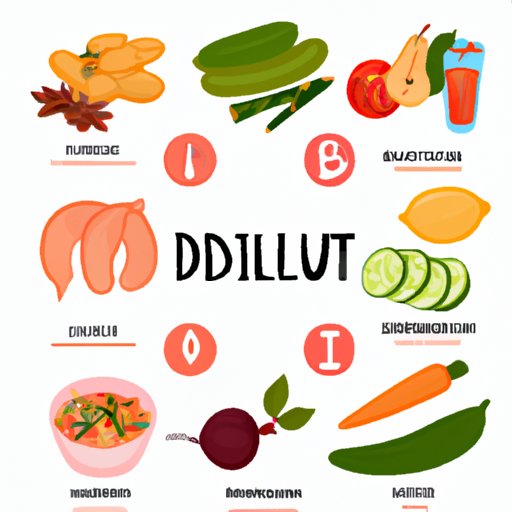
I. Introduction:
Bloating is an uncomfortable and common problem that many people experience due to changes in the gastrointestinal tract. Bloating can have a significant impact on a person’s quality of life, causing discomfort, pain, and sometimes embarrassment. Identifying the foods responsible for bloating is crucial in managing this condition. In this article, we will explore the top 10 foods that might be making you bloated, the surprising culprits, and what foods to avoid if you want a flat tummy. We will also provide alternative choices to reduce the discomfort and how to eliminate or reduce bloating-causing foods in your diet.
II. 10 Foods That Might Be Making You Bloated: A Guide to Reducing Discomfort
Some foods are more likely to cause bloating than others. Let’s discuss the top 10 foods that commonly cause bloating:
- Beans
- Dairy products
- Processed foods
- Wheat products
- Sugar alcohols (such as sorbitol, mannitol, xylitol)
- Cabbage and broccoli
- Cauliflower and Brussels sprouts
- Carbonated drinks
- Chewing gum
- Fatty foods
These foods contain substances that are hard to digest, ferment in the gut and cause flatulence or increase water retention.
So what can you eat instead? Opt for whole grains, fresh fruits and vegetables, lean protein, and healthy fats like olive oil and nuts.
III. The Surprising Culprits: Why These Common Foods Could Be Causing Your Bloating
While some foods commonly cause bloating, some healthy foods can also cause it. Here are the surprising culprits:
- Fruits such as apples, pears, and cherries
- Vegetables such as artichokes, asparagus, and onions
- Legumes such as lentils, chickpeas, and soybeans
- Whole grains such as barley and rye
Fruits and vegetables are typically healthy, but they can cause bloating due to the presence of fructose, a type of sugar that is poorly absorbed by certain people. Legumes and whole grains contain complex carbohydrates, which may be challenging to digest for some people. Therefore, for those who experience bloating after consuming these foods, choosing low-fructose fruits, low FODMAP vegetables, and gluten-free grains is a better choice.
IV. Top 7 Bloating Foods to Avoid if You Want a Flat Tummy
If you’re looking for a flat tummy, here are the top seven bloating foods to avoid:
- Carbonated drinks
- High-fat foods and fried foods
- Artificial sweeteners such as aspartame, sucralose and sorbitol
- Salt-rich foods
- Processed foods
- Caffeine
- Dairy products
These foods contain substances that can cause bloating or water retention, and their consumption should be limited or avoided altogether. Instead, choose still or sparkling water, low-fat and fresh foods, natural sweeteners, herbs and spices, and lactose-free dairy products.
V. Do You Suffer from Bloating? Check Your Diet: 6 Foods That Could Be to Blame
Here are six commonly consumed foods that can cause bloating:
- Wheat
- Garlic
- Onions
- Barley
- Rye
- Beans
These foods contain FODMAPs (fermentable oligosaccharides, disaccharides, monosaccharides, and polyols), which can cause bloating in sensitive individuals.
So what can you eat instead? Gluten-free grains such as quinoa, gluten-free oats, chia seeds, and flaxseeds are an excellent source of vitamins, minerals, and fiber. Alternatively, opt for garlic and onion replacements such as ginger, turmeric, or herbs and spices with similar flavors.
VI. The Bloat-Free Diet: How to Eliminate (or Reduce) the Top Bloating Foods
Avoiding bloating-causing foods can be challenging, especially when many of these foods are staples in our diet. However, there are some tricks you can use to reduce bloating:
- Avoid overeating or eating too quickly
- Chew your food thoroughly
- Switch to gluten-free grains
- Choose low-fructose fruits
- Limit salt intake
- Avoid carbonated drinks
- Use lactose-free dairy products
- Create a food diary to identify the foods that cause bloating
These tips can help reduce the chances of bloating. When you do experience bloating, drinking plenty of water, and engaging in physical activity can help relieve the symptoms.
VII. Unveiling the Secrets of Bloating: What Foods to Avoid and Alternatives to Try
Identifying the foods that cause bloating can be tricky, and sometimes it takes a bit of detective work to figure out the culprits. Food allergy testing or a trial of a low-FODMAP diet can be useful in identifying triggers.
Alternative food options to try if you must avoid bloating-causing foods include:
- Low FODMAP vegetables, such as spinach, zucchini, and cucumbers
- Lean protein sources such as chicken, turkey, fish, and tofu
- Gluten-free grains like rice, quinoa, and amaranth
- Low fructose fruits such as strawberries, kiwi, and cantaloupe
These alternative options can ensure that you still get the essential nutrients that your body needs without the discomfort of bloating.
VIII. 5 Foods That Commonly Cause Bloating and What to Eat Instead
If we sum up the most common foods that cause bloating, the list would be:
- Beans
- Dairy products
- Processed foods
- Carbonated drinks
- Wheat products
Instead, opt for the following:
- Peas, lentils, and chickpeas
- Lactose-free dairy products
- Fresh and whole foods
- Still or sparkling water
- Gluten-free grains
IX. Conclusion
Bloating is an uncomfortable and common problem that can have a significant impact on a person’s quality of life. However, identifying and addressing trigger foods can help reduce bloating and alleviate the symptoms. It’s essential to become aware of the top bloating-causing foods, surprising culprits, and avoid them for a flat tummy. Try to switch to alternative food options to ensure that your body gets the essential nutrients without the bloating. Please note that if you face persistent bloating symptoms, please seek medical advice.




